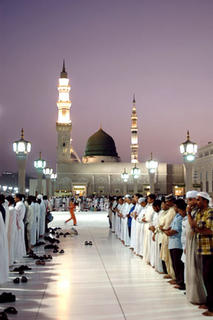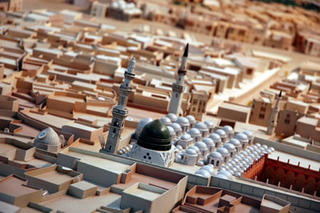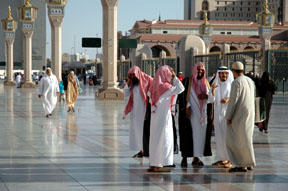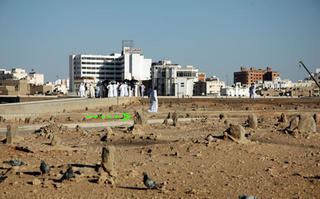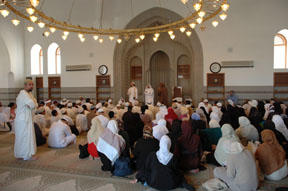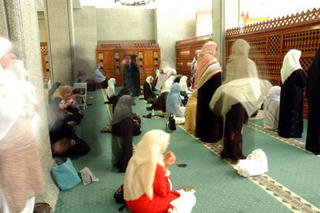 Photo: Masjid Quba. This is the first mosque in the history of Islam whose foundation stone was laid down by Prophet Muhammad (peace be upon him) himself on his migration to Madinah. © Fareena Alam. Please do not re-use without permission and proper credit.
Photo: Masjid Quba. This is the first mosque in the history of Islam whose foundation stone was laid down by Prophet Muhammad (peace be upon him) himself on his migration to Madinah. © Fareena Alam. Please do not re-use without permission and proper credit.The morning we arrived in Madinah, we decided not to rush to see the Prophet (صلي الله عليه و سلم). Someone told us it is better to do ghusl, put on some new clean clothes, recite some salawat on the Prophet (صلي الله عليه و سلم) and then visit him. The British gang were weary (and probably a little stinky) after a 5 hour flight and another 7 hour bus ride from Jeddah to Madinah - the anticipation was spiritually uplifting but we all know what happens when the first blast of hot, humid Jeddah air hits you.
As we stopped for a drink at the hotel cafeteria, our dear friend Aftab rushed past me. He said, "There's been a terrorist attack on London. Several bombs went off on the tube."
I froze. Bombs. Terrorists. Tube. Central London. Home. My home. My husband. My sister.
I ran upstairs to my hotel room, desperate to find my mobile phone so I could speak to my husband. Who cared about exhorbitant Vodaphone charges for global roaming calls. I flicked the TV on as I struggled with the dialing codes.
And then, my heart sank. The CNN ticker at the bottom of the screen said "Bus explosion at Tavistock Square" - just outside our home, as footage from the Russell Square and Kings Cross Tube Stations (both local to us) flashed across the screen.
My husband's phone was dead. I kept trying and at some point, I began to weep.
When embarking on a journey as momentous as the Rihla in Madinah, all the 'big questions' pop up. What if I never come back? What if I die in Madinah (
Alhamdulillah, everyone who dies in the Radiant city is buried in Jannatul Baqi)? What will happen to my husband and my family?
To learn that something disastrous has happened in my home city and that my husband is unreachable was too much to deal with at that point. I am generally an optimist but am capable of moments of sheer paranoia. My mind raced. How should I deal with this pain if my worst fears come true? I should lose myself in Madinah. Allah will nurse my heart.
Suddenly, my husband's voice came through the phone. I lost it at that point. I was so grateful.
After I had calmed down, the anger grew within me. We had no idea who the perpetrators were at that point. Muslim (most likely) or not, I was furious and I felt violated. How dare they. I was furious at all the half-baked rhetoric we hear from sections of the Muslim communities - "Islam is about peace... but look what they're doing to us in Iraq"... "Muslim youth are some of the most disenfranchised in British society" - so flippin' what? Are these justifications for blowing oneself up while trying to kill as many other civilians as possible? Call me sick but I sometimes wonder what the culprits in our community, who encourage their impressionable followers to become suicide bombers, would say if their own wives and children were blown to pieces as collateral damage. After all, these people have no trouble living in the UK while they peddle their myopic agendas.
I was a little miffed that I was here in Madinah and not in London where I could have been of some help in my area. With over 50 dead and 700 injured in the four bombs, there were requests for blood donations, etc. If a leaf does not fall from its tree without Allah's order, I grew certain I was in Madinah for a good reason. I did not fancy the thought of dealing with all the calls from the media.
Later that week, at the Rawda, I cried relentlessly as I asked Allah and the Prophet (صلي الله عليه و سلم) why our people have reached this low point. I asked Allah to instill love, mercy and patience in our hearts. I asked Him to increase our remembrance of our Prophet Muhammad (صلي الله عليه و سلم) - in whose name these criminals misguide our young men.
Fellow Muslims may be suffering in Palestine, Iraq, Kashmir, Chechnya but Allah has not made us His vicegerants on this earth so we can learn from the perpetrators of injustice. They are not our teachers. We do not stoop just because they stoop.
-
f -
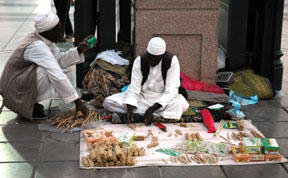 Photo: Street vendor selling miswaks and other knick knacks outside the Prophet's Mosque. © Fareena Alam. Please do not re-use without permission and proper credit.
Photo: Street vendor selling miswaks and other knick knacks outside the Prophet's Mosque. © Fareena Alam. Please do not re-use without permission and proper credit.